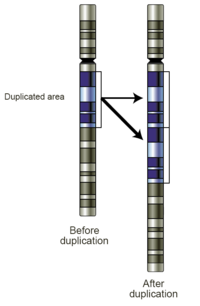
Photo from wikipedia
Meiotic recombination is a critical process for sexually reproducing organisms. This exchange of genetic information between homologous chromosomes during meiosis is important not only because it generates genetic diversity, but… Click to show full abstract
Meiotic recombination is a critical process for sexually reproducing organisms. This exchange of genetic information between homologous chromosomes during meiosis is important not only because it generates genetic diversity, but also because it is often required for proper chromosome segregation. Consequently, the frequency and distribution of crossovers are tightly controlled to ensure fertility and offspring viability. However, in many systems it has been shown that environmental factors can alter the frequency of crossover events. Two studies in flies and yeast point to nutritional status affecting the frequency of crossing over. However, this question remains unexplored in mammals. Here we test how crossover frequency varies in response to diet in Mus musculus males. We use immunohistochemistry to estimate crossover frequency in multiple genotypes under two diet treatments. Our results indicate that while crossover frequency was unaffected by diet in some strains, other strains were sensitive even to small composition changes between two common laboratory chows. Therefore, recombination is both resistant and sensitive to certain dietary changes in a strain-dependent manner and, hence, this response is genetically determined. Our study is the first to report a nutrition effect on genome-wide levels of recombination. Moreover, our work highlights the importance of controlling diet in recombination studies and may point to diet as a potential source of variability among studies, which is relevant for reproducibility.
Journal Title: Genetics
Year Published: 2021
Link to full text (if available)
Share on Social Media: Sign Up to like & get
recommendations!